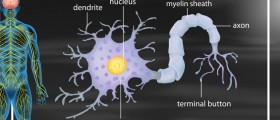Multiple Sclerosis
Multiple sclerosis is a very serious disease in which the protective myelin sheath that covers the nerve cells is destroyed by the immune system of the body. Thus the brain and the spinal cord are affected. Because of that, the connection between the brain and the rest of the body is impaired.
In most serious cases, multiple sclerosis may lead to nerve deterioration and cannot be cured. This condition more frequently occurs in women than men, and usually appears in people between the ages of 20 and 40. Multiple sclerosis is very difficult for diagnosing in the early stages because symptoms usually come and go suddenly.
The most common symptoms of this disease are muscle weakness, problems with the eyes, imbalance, lack of concentration, and memory problems. Multiple sclerosis may be inherited, or certain other factors may cause it, such as specific bacteria or viruses or geographical location, because it is proven in some studies that this disorder is most common in regions with high temperatures.

Homeopathic Remedies for Multiple Sclerosis
It is very important to promptly treat multiple sclerosis. Sometimes, certain homeopathic remedies can do much to help people that suffer from this disease, but it is crucial to consult a good homeopath when one decides to use a homeopathic remedy. The homeopath prescribes the specific homeopathic remedy, depending on the symptoms of the disease, as well as depending on the health history of the patients. Furthermore, the physical and mental health of the patient are also regarded when the homeopathic remedy is chosen.
Homeopathic remedies are made of herbs, minerals, and other healthy ingredients which are harmless and very effective. The most frequently recommended homeopathic remedies for treating multiple sclerosis are Phosphorus, Zinc, Thuja, Sulphur, Causticum, and Gelsemium. In addition to these, several others are also very helpful for people that suffer from this serious condition, and they include Alumina, Atropine, Lath, Physo, Plumbum, Calcium, Irid, and Nux Vomica.
- Management is largely directly of symptoms which arise variably in the course of the condition. Such problems as urinary incontinence, sexual dysfunction, cramps and spasms, tremor and trigeminal neuralgia can often be helped to some extent using conventional therapies. These treatments though are not effective in everyone, or cause unacceptable side-effects and there are some commonly reported symptoms, such as fatigue or emotional lability for which there are no generally accepted treatments.
- Here, a knowledge of complementary and alternative medicine (CAM) can bring benefits to the person with MS.
- CAM is widely used by people with MS and some studies in this area are briefly summarised. It is interesting to reflect what lies behind all this CAM use and what that might tell conventional medicine about just what it is the MS sufferer really wants from their carers.
- Homeopathy is a form of CAM unique in the UK in having been available in the NHS since the foundation in 1948. Medical homeopaths in the UK have always been concerned with the integration of the best of conventional and complementary treatments for the benefit of their patients.
- Glasgow Homeopathic Hospital has around 100 admissions each year of people with MS at different stages of the condition and aims at an integrated response to their distress. Different therapeutic modalities are employed, but a homeopathic approach in particular is of benefit in MS. By its nature, it is a whole-person approach and allows for complete individualisation of treatment, taking account of the minutiae of someone's life.
Natural Cures for Multiple Sclerosis
To treat multiple sclerosis, certain counseling, physical and occupational therapies are recommended. It is very important to perform specific strengthening exercises to stay independent in daily activities. These exercises, as well as using certain helping devices, can be learned in occupational or physical therapy.
However, fatigue is a common sign of this disease and therefore, taking rest is important, too. Aerobic, swimming, avoiding extreme heat, and a balanced diet may contribute to reducing the symptoms of multiple sclerosis.
- www.sciencedirect.com/science/article/pii/S2225411016302267
- mstrust.org.uk/a-z/homeopathy
- Photo courtesy of Joshua Mayer by Wikimedia Commons: commons.wikimedia.org/wiki/File:Thuja_occidentalis_foliage_Wisconsin.jpg

















Your thoughts on this
Loading...